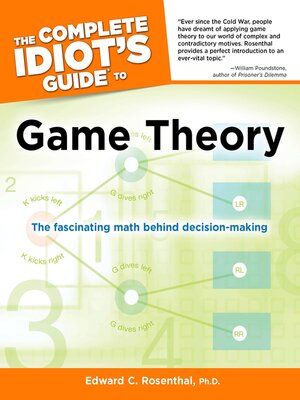The Complete Idiot's Guide to Game Theory
ebook ∣ Complete Idiot's Guides
By Edward C. Rosenthal Ph.D.

Sign up to save your library
With an OverDrive account, you can save your favorite libraries for at-a-glance information about availability. Find out more about OverDrive accounts.
Find this title in Libby, the library reading app by OverDrive.



Search for a digital library with this title
Title found at these libraries:
| Library Name | Distance |
|---|---|
| Loading... |
Gain some insight into the game of life...
Game Theory means rigorous strategic thinking. It is based on the idea that everyone acts competitively and in his own best interest. With the help of mathematical models, it is possible to anticipate the actions of others in nearly all life's enterprises. This book includes down-to-earth examples and solutions, as well as charts and illustrations designed to help teach the concept. In The Complete Idiot's Guide® to Game Theory, Dr. Edward C. Rosenthal makes it easy to understand game theory with insights into:
• The history of the discipline made popular by John Nash, the mathematician dramatized in the film A Beautiful Mind
• The role of social behavior and psychology in this amazing discipline
• How important game theory has become in our society and why
Game Theory means rigorous strategic thinking. It is based on the idea that everyone acts competitively and in his own best interest. With the help of mathematical models, it is possible to anticipate the actions of others in nearly all life's enterprises. This book includes down-to-earth examples and solutions, as well as charts and illustrations designed to help teach the concept. In The Complete Idiot's Guide® to Game Theory, Dr. Edward C. Rosenthal makes it easy to understand game theory with insights into:
• The history of the discipline made popular by John Nash, the mathematician dramatized in the film A Beautiful Mind
• The role of social behavior and psychology in this amazing discipline
• How important game theory has become in our society and why







